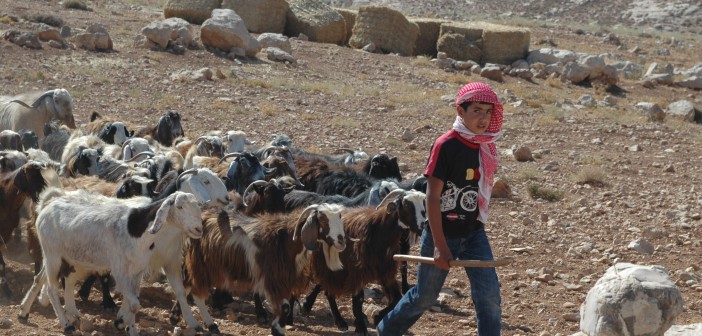(Featured image: Bedouin boy and sheep in the occupied West Bank. Photo credit Kim Bartlett – Animal People, Inc.)
By María Elena García, PhD
Director, Comparative History of Ideas
University of Washington
For more than a decade and with many others, I have been trying to think through the multiple entanglements between human and non-human joys and suffering. This work has been transformational for many of us, but not without its challenges. One of the most common difficulties we encounter lies in the concern with a human-centered understanding of suffering. Why should we worry about animals, the concern goes, “when there is still so much to do for humans.” This is an important objection and also an opportunity to broaden the conversation about what lives matter and why. Moving away from zero-sum discussions that suggest a concern for “animals” takes away from urgent “human” problems, we emphasize the intersections among lives. Recognizing the undeniable biological fact that none of us is “alone” in the world but rather intimately connected to other beings that range from the microorganisms who live in our bodies to the animals in farms, slaughter houses and laboratories, we question how stark the line is between human and non-human. Moreover, our thinking about human issues necessarily involves thinking about animal issues. Similarly, considering animals expands our understanding of the world around us including some of the most pressing issues at hand, such as climate change, food justice, racial violence, and colonial legacies of dispossession and environmental degradation.
In my own intellectual career, my concern with the “animal question” began in the classroom. I then moved to broader initiatives once I arrived at the UW where I found friends and colleagues who were eager to help. Together, a motivated and interdisciplinary group of undergraduates, graduate students, staff, and faculty created the Critical Animal Studies Working Group at UW. Together we found ourselves facing once again the question about why we should care about animals. As before, our answer was about Intersectionality, the ways in which questions about the human, about race, about gender, are often already questions about life more broadly understood. Our efforts resulted in various on-going speaker series and workshops organized under the projects of “The Postcolonial Animal” and more recently “Intersectional Animal Studies.” What these projects illustrate powerfully is that animal advocates must consider human complexity and especially the ways concerns over animals raise broad issues of oppression and inequality. To think, for example, about a factory farm or a disassembly line is to think about migrant laborers doing dangerous work, about the ways in which female animals face particular kinds of violence and how economics structures what bodies do what kind of work. Questions about the land and our food also take us back to difficult questions about our own place in settler-colonial contexts. Without romanticizing Native ways of knowing, we must acknowledge that Indigenous notions about our relations and responsibilities to nature raise urgent issues about our place in the world. Here is a brief video where I discuss some of these issues within the context of our work at the University of Washington. To connect with us, please contact me at meg71@uw.edu.






1 Comment
To find out more about Professor García’s work on intersectional animal studies, have a look at a description of her recently-funded collaborative research project at the University of Washington:
https://simpsoncenter.org/projects/intersectional-animal-studies-thinking-humans-and-animals-together
And check out the project’s twitter account @IntersectAnimal!